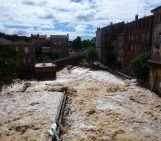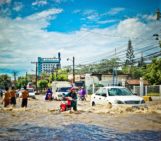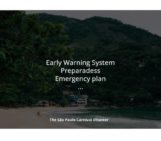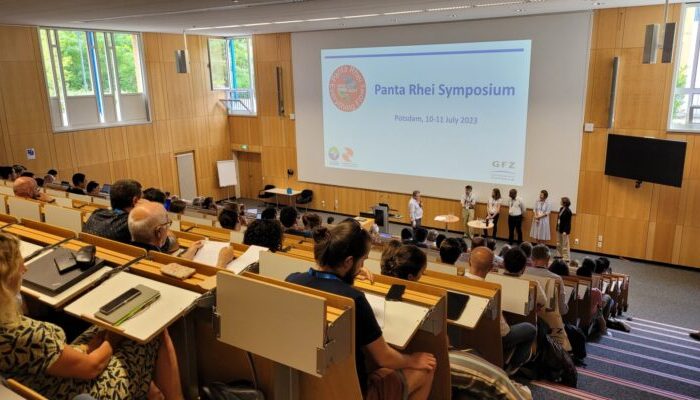
On the 10th and 11th of July 2023, the final symposium for the scientific decade, “Panta Rhei – Everything Flows: Change in Hydrology and Society” of the International Association of Hydrological Sciences (IAHS), took place at the German Research Centre for Geosciences (GFZ) in Potsdam. During these two days, 150 hydrologists, engineers, social scientists and practitioners from 32 countries gathered in Potsdam to reflect on and celebrate the progress made in the past ten years and identify issues that should be addressed in the upcoming scientific decade.
In this post, Elena Macdonald provides some insights into the Panta Rhei symposium from the natural hazard perspective.
Natural hazards and the Panta Rhei Decade
Panta Rhei was the second scientific decade coordinated by the IAHS to accumulate and accelerate scientific knowledge through collaborative forces. The Panta Rhei decade is an initiative focused on the study of interactions and feedbacks between hydrology and society. The work of the more than 500 initiative members showed that long-term developments, such as feedbacks between natural and socio-economic processes, need to be understood better. Human interventions can lead to unintended, negative consequences if we fail to consider such developments and feedback.
Researchers involved in Panta Rhei found that flood and drought risk management needs to adopt a longer-term complex system view rather than focusing on short-term risk reduction. Specifically, the challenge of integrating human behaviour in dynamic risk assessments needs to be addressed. This involves combining consideration of qualitative and quantitative data and coupling hazard models with behaviour models in socio-hydrological modelling systems.
The importance of case study relevant design and implementation of research studies was one of the topics for discussion during the Panta Rhei decade. Firstly, justice and equity need to be considered in these processes, and secondly, involving stakeholders through a participatory approach adds relevant detail and legitimacy. Also, the scientific decade addressed several new research activities on multi-risk from extreme weather (e.g. floods, droughts and heatwaves) along with new data sources, methodologies and innovative approaches for research communication.
In addition, the scientific decade fostered international collaborations and discussions.
One fundamental outcome of Panta Rhei was to highlight the potential for learning from similar water problems in different places worldwide.
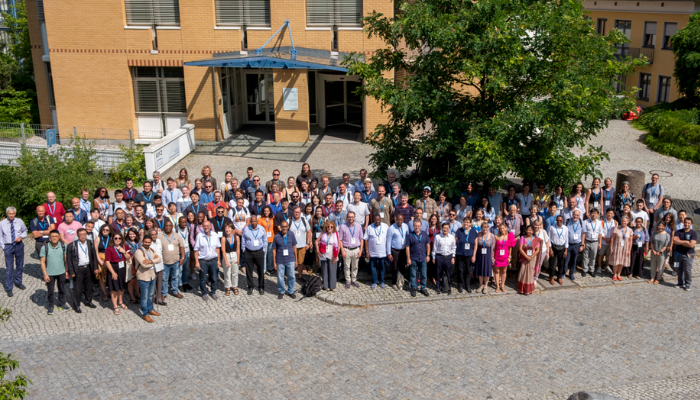
The final Panta Rhei symposium attendees gathered at the German Research Centre for Geosciences (GFZ) in Potsdam. (photo credit: Martin Ehmler, GFZ)
Heidi Kreibich, chair of the Panta Rhei initiative from 2021 to 2023, says: “The Panta Rhei decade came to an end, but the vibrant, active community will continue to work together in other IAHS activities like the new decade ‘Science for solutions: Hydrology Engaging Local People IN one Global world’.”
The Final Panta Rhei Symposium
The final Panta Rhei symposium brought everyone to Potsdam. The opening lecture was inspiring; Johan Rockström (Director of the Potsdam Institute for Climate Impact Research, Germany) discussed planetary boundaries and water as a common good. The two keynote speakers on the second day wonderfully complemented each other by each addressing one of the main aspects of the Panta Rhei decade. Manuela Brunner (Professor at ETH Zurich, Switzerland) gave insights on change in hydrology by presenting climate and reservoir influences on droughts, floods, and their transitions. In contrast, Joerg Niewoehner (Director of the Integrative Research Institute on Transformations of Human-Environment Systems IRI THESys, Germany) focussed on societal aspects in his talk on understanding water through integration and agonism.
Another highlight of the programme was the panel discussions; panellists from around the world elaborated on the transfer of results from Panta Rhei to practice, as well as on remaining gaps and future research. In addition, more than 40 young scientists had the opportunity to present their work in flashlight talks and posters. They addressed the impacts of floods and droughts in various case studies or aimed to characterise compound droughts, heatwaves, and compound floods in Europe. Further, studies on drought and flood risk management and disaster risk reduction strategies were presented.
The programme closed with a visionary outlook by Günter Blöschl (Professor at TU Wien, Austria, and past president of IAHS). This brought the Panta Rhei decade to an end, making room for the new scientific decade HELPING, launched just a few days later in Berlin.
Post edited by Asimina Voskaki and Shreya Arora


